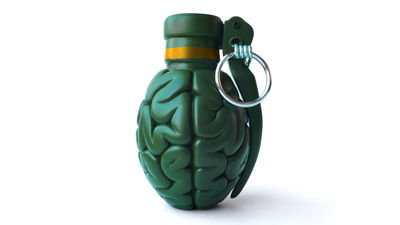Scientists succeeded in restoring brain function of Alzheimer's disease mice

byMedia News
Alzheimer's diseaseIs a disease that causes symptoms such as a decline in cognitive function and a change in personality accompanying atrophy of the brain. In modern medicine it is impossible to cure Alzheimer's disease and Bill · Gates sums 11 billion yen to study Alzheimer's diseaseInvestThere are also many diseases that many people are longing for the discovery of treatment. Meanwhile, "I restored the brains of mice with Alzheimer's disease"Cleveland · Clinic · Learner Research LaboratoryThe research team of the company announced.
Scientists Reverse Alzheimer's in Mice
https://futurism.com/scientists-reverse-alzheimers-in-mice/
Researchers successfully reverse Alzheimer's disease in mouse model
https://medicalxpress.com/news/2018-02-successfully-reverse-alzheimer-disease-mouse.html
BACE 1 deletion in the adult mouse reverses preformed amyloid deposition and improves cognitive functions | JEM
http://jem.rupress.org/content/early/2018/02/13/jem.20171831
One of the early symptoms of Alzheimer's disease is a type of protein in the brainAmyloid β peptide"Amyloid plaque" accumulates in the skin. It is thought that amyloid plaques gradually kills nerve cells of Alzheimer's disease patients and has a serious effect on brain functions.
The research team is involved in the production of amyloid β peptide involved in the formation of amyloid plaques,BACE 1I focused on the enzyme. Since BACE 1 acts on amyloid and produces harmful amyloid β peptide, the research team thought that "If you inhibit the function of BACE 1 itself, it should prevent the generation of amyloid plaques."
However, BACE 1 also plays a role in affecting proteins other than amyloid, and it is thought that inhibiting work may cause serious side effects. Therefore, the research team formed amyloid plaques 75 days after birth, and gradually incorporated a gene that inhibits the function of BACE 1 as it grows to a mouse group having a gene that would lead to the onset of Alzheimer's disease. As a result, it was found that the study that mice forming amyloid plaques in the brain at the age of 75 days stopped the formation of amyloid plaques at the age of 10 months, and the already formed amyloid plaques also disappeared It is said that it was obtained. Mice with amyloid plaques removed do not develop Alzheimer's disease, and there seems to be no problem with cognitive function.

byorientalizing
"The study found that inhibition of BACE 1 not only prevents the formation of new amyloid plaques, but can also eliminate once formed amyloid plaques," the research team has announced. In addition, it was a mouse that was worried about side effects caused by inhibiting BACE1, but it seems that it could not be confirmed that there was a problem with health visibly. While making this result a certain outcome, researchers said, "Currently it has been successful only in mouse experiments and it is undecided what kind of effect will be exerted when treating humans.BACE 1 It is also a substance that contributes to the formation of the body and it is necessary to concern about the side effect that occurs when it is completely deleted. "We will continue to conduct experiments carefully in the future.
However, at the age of 75 days after the start of formation of amyloid plaque, it was not possible to conclude that the mouse was still "having developed Alzheimer's disease", and only "I will develop Alzheimer's disease in the future" He said that he was just an estimated state. Even in humans, accumulation of amyloid plaques does not necessarily lead to the onset of Alzheimer's disease, and there are cases where Alzheimer's disease does not occur even if amyloid plaques are accumulated above a certain level.

byMichael Coghlan
Rather than saying "I am recovering mice after onset of Alzheimer's disease", this research also said, "By intervening in a mouse that is predicted to develop Alzheimer's disease in the future and removing accumulated amyloid plaques, the onset of Alzheimer's disease It should be said that it prevented it. However, the findings of this study seem to be meaningful in showing that it is meaningful that "the onset factor of Alzheimer's disease in mice is never irreversible and can be interventioned after it is diagnosed that future onset is expected" Yes.
Establishment of therapy for Alzheimer's disease is a long-awaited goal for many people, but the results of this study are still the first step in establishing therapy. Whether experimental results of mice lead directly to human therapy depends on future research and I hope that ongoing research will bring good results.
Related Posts:
in Science, Posted by log1h_ik







